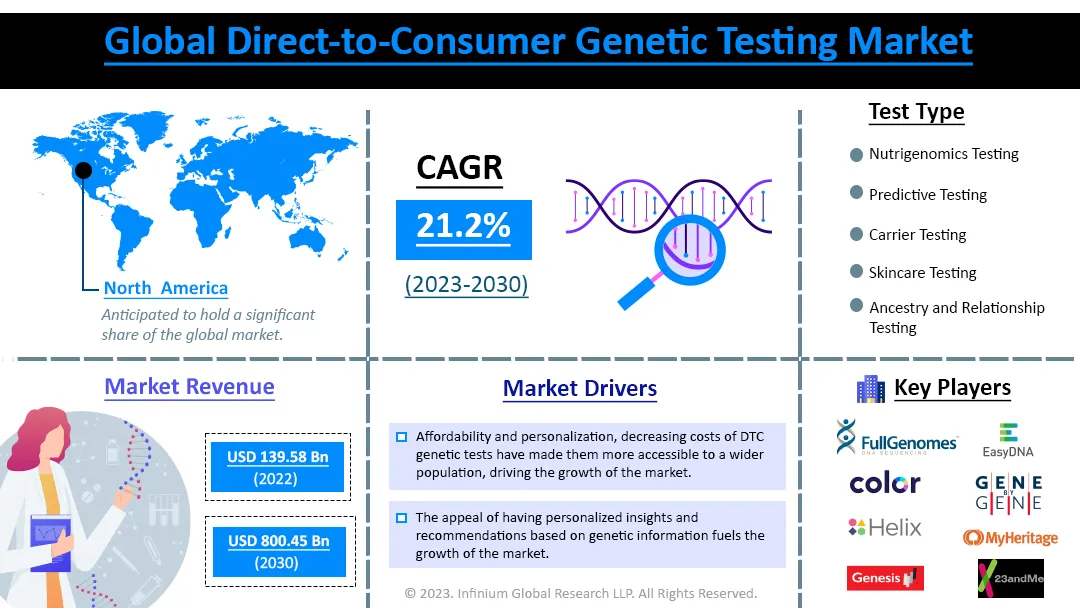Direct-to-Consumer Genetic Testing Market (Test Type - Nutrigenomics Testing, Predictive Testing, Carrier Testing, Skincare Testing, and Ancestry and Relationship Testing; Technology Type - Target Analysis, Single Nucleotide Polymorphism (SNP) Chips, and Whole Genome Sequencing (WGS); Distribution Channel - Online Platforms, and Over-the-Counter): Global Industry Analysis, Trends, Size, Share and Forecasts to 2030
A recent report published by Infinium Global Research on direct-to-consumer genetic testing market provides in-depth analysis of segments and sub-segments in the global as well as regional direct-to-consumer genetic testing market. The study also highlights the impact of drivers, restraints, and macro indicators on the global and regional direct-to-consumer genetic testing market over the short term as well as long term. The report is a comprehensive presentation of trends, forecast and dollar values of global direct-to-consumer genetic testing market.
Market Insight:
The industry that provides genetic testing services directly to customers without consulting a healthcare professional is known as the "direct-to-consumer genetic testing market." Anyone interested in knowing more about their genetic makeup can purchase these tests, which are normally available online or in stores. DTC genetic tests can be used to find out a person's ancestry, measure their risk of specific diseases, or learn about their physical characteristics. The outcomes of these exams can be utilized to plan for future medical requirements, make wise lifestyle decisions, or simply get a better understanding of oneself. The use of direct-to-consumer genetic testing provides several advantages such as it can provide individuals access to their genetic data without requiring them to go through a healthcare provider. Additionally, the cost of DTC is relatively less and affordable.
The Direct-to-Consumer (DTC) genetic testing market is driven by various factors such as, affordability and personalization. Decreasing costs of DTC genetic tests have made them more accessible to a wider population, driving the growth of the market. Affordable pricing has expanded the consumer base and increased demand for these tests. Personalization is another key driver, as DTC genetic tests provide individuals with personalized information about their genetic makeup, including health risks and ancestry. This personalized data empowers individuals to make informed decisions about their lifestyle choices, healthcare, and other aspects of their lives. The appeal of having personalized insights and recommendations based on genetic information fuels the growth of the market. However, concerns surrounding the confidentiality of genetic data restrain the market. Individuals may be apprehensive about relinquishing control over their genetic information and potential misuse by employers or insurance providers. Privacy and ethical concerns related to the handling and usage of genetic data hinder the market's growth potential. An opportunity for the market lies in rising pharmacogenetic research. As the field advances, DTC genetic testing companies can offer personalized insights into how genetic factors influence an individual's response to medications. This creates opportunities for tailored and more effective treatment plans, presenting a significant growth avenue for the market.

North America is anticipated to hold a significant share of the global market due to dominant consumer attitudes toward genetic testing and increased expenditure on Direct-to-Consumer (DTC) genetic testing. The region benefits from a rising demand for personalized genetic testing services and an increase in the prevalence of chronic and genetic disorders. On the other hand, Europe is projected to experience substantial market growth, showcasing the fastest growth rate during the forecast period. The region's market growth is driven by factors such as increased emphasis on early disease detection and prevention, as well as the growing application of genomic examination.
Report Scope of the Direct-to-Consumer Genetic Testing Market:
| Report Coverage | Details |
|---|---|
| Market Size in 2022 | USD 139.58 Billion |
| Market Size by 2030 | USD 800.45 Billion |
| Growth Rate from 2023 to 2030 | CAGR of 21.2% |
| Largest Market | North America |
| No. of Pages | 255 |
| Market Drivers |
|
| Market Segmentation | By Test Type, By Technology Type, and By Distribution Channel |
| Regional Scope | North America, Europe, Asia Pacific, and RoW |
Segment wise revenue contribution in the global direct-to-consumer genetic testing market
The report on global direct-to-consumer genetic testing market provides a detailed analysis of segments in the market based on Test Type, Technology Type, and Distribution Channel.
Segmentation Based on Test Type
· Nutrigenomics Testing
· Predictive Testing
· Carrier Testing
· Skincare Testing
· Ancestry and Relationship Testing
Segmentation Based on Technology Type
· Target Analysis
· Single Nucleotide Polymorphism (SNP) Chips
· Whole Genome Sequencing (WGS)
Segmentation Based on Distribution Channel
· Online Platforms
· Over-the-Counter
Company Profiled:
· Full Genomes Corporation, Inc.
· EasyDNA
· Color Health, Inc.
· Gene by Gene, Ltd.
· Helix OpCo, LLC
· MyHeritage Ltd.
· 23andMe, Inc.
· Genesis HealthCare
· Ancestry
· Other Companies
Report Highlights:
The report provides deep insights into demand forecasts, market trends, and micro and macro indicators. In addition, this report provides insights into the factors that are driving and restraining the growth in this market. Moreover, The IGR-Growth Matrix analysis given in the report brings an insight into the investment areas that existing or new market players can consider. The report provides insights into the market using analytical tools such as Porter's five forces analysis and DRO analysis of the direct-to-consumer genetic testing market. Moreover, the study highlights current market trends and provides forecasts from 2023-2030. We also have highlighted future trends in the market that will affect the demand during the forecast period. Moreover, the competitive analysis given in each regional market brings an insight into the market share of the leading players.
